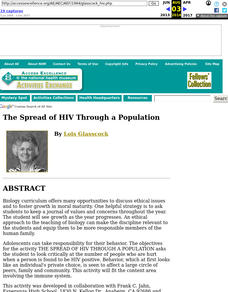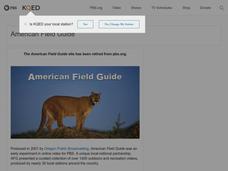Curated OER
Monitoring an Epidemic: Analyzing Through Graphical Displays Factors Relating to the Spread of HIV/AIDS
Tenth graders differentiate pandemic and epidemic. For this health science lesson, 10th graders analyze how HIV and AIDS affect different countries. They construct and interpret different types of graphs.
Curated OER
Student Investigation on the Immune System and Hemeagglutination
Learners perform an experiment to demonstrate the principles of antibody-antigen binding, the secondary immune response, cross reactivity, and complement fixation. The materials to be used include antibodies from a rabbit that was...
Curated OER
The Spread of HIV Through a Population
Students use a model to illustrate the spread of HIV through an adolescent population and, acting in the role of epidemiologists, explore the dilemmas of HIV infection presented by the simulation. beneficence and justice.
Curated OER
Biotechnology and The Chocolate Milk Cow
Learners discuss new discoveries that have resulted from the use of recombinant DNA technology and otehr biotechnology. In groups, they create a transgenic cow capable of producing chocolate-flavored milk.
Curated OER
Testing Your Water
Students perform several water quality tests on groundwater from their area. They use test strips to determine the pH, hardness, alkalinity, nitrates, iron and chloride levels.
Curated OER
The Birds and the Beaks
Students explore the adaptations that birds have. In this adaptations lesson students view a video and create a concept map of birds and their adaptive traits.
Curated OER
Cardiac Arrest! Using Forensics to Investigate Cardiovascular Anatomy and Function
Students identify the different parts and functions of the cardiovascular system. In this forensics lesson, students collect and analyze evidence on a fictional crime. They describe different causes of cardiac arrest.
Curated OER
Making Connections: Exploring Our Brains through the Five Senses
Students record observations and create drawings and models of anatomy using their five senses. They describe the structures of a neuron and analyze each of their functions. They compare and contrast the typical structural features of a...
Curated OER
Elements of Civilization
Students create their own ancient civilizations based off of topographical maps of Egypt, Mesopotamia, the Indus Valley, and the Yellow River. In this social studies lesson, students are assigned one topographical map to use to create...
Curated OER
The Perfect Cow?
High schoolers examine how cattle have evolved through natural selection and selective breeding. In this natural selection lesson students compare and contrast natural and artificial selection.
Curated OER
Ghost in Your Genes
Students explore DNA microarrays. In this genetics instructional activity, students model DNA microarrays that are used by scientists. Students work to determine levels of breast cancer genes in patients. They will determine the...
Curated OER
The Loneliest Animals
Learners examine the different species that are headed towards extinction. In this animal population lesson students compare the causes of extinction, research an endangered species and present an oral report.
Curated OER
Comparing Chimp mtDNA to Learn about Races
For this computer-based lesson, students will measure genetic diversity within and between three subspecies of chimpanzees in order to gain a better understanding of genetic distinctiveness and explore race as a genetic concept.
Michigan Sea Grant
Food Chains and Webs
Starting with a simple food chain, young scientists interpret the difference and interrelatedness between herbivores, carnivores and producers. They answer questions related to cause and effect of food chain disruptions, including the...
Curated OER
Comparing Ovaries And Testes
In this reproductive system learning exercise, students compare specimens of rat ovaries and testes. They complete 5 short answer pre-lab questions, follow an 11 step procedure and answer 5 analysis questions.
Curated OER
Mammals: Mammals and Their Ways
Students study the difference between innate and learned behaviors. They observe the adaptations and behaviors of mammals in this series of lessons.
Curated OER
Food For Thought
Students examine their school population about their health and exercise patterns. They brainstorm a list of factors that influence people to eat the way they do.
Curated OER
Anatomy and Physiology "Quickies"
Students use a variety of creative writing tools within this assignment: poems on particular organ systems, write a short story and/or create a word graph. They are involved in a demonstration of lactic build up in the muscles, a...
Curated OER
Freshwater Fish Water Quality
Sixth graders work together to complete an experiment about the quality of freshwater. In groups, they collect fresh water samples from a variety of sources and test the pH levels. After completing a KWL chart, they test the amout of...
Curated OER
How HIV Infects Cells
In this how HIV infects cells worksheet, students read the given information about how HIV infects cells. Students explain the role of various structures in HIV infection. Students design a drug that might slow the rate of cellular...
Curated OER
Marine Life Protected Areas in the O.C.
Students research a Marine Protected Area and determine the species' that benefit from its protection. In this marine lesson students present their findings to the class using PowerPoint.
Curated OER
SKIN CARE: ACNE
Students study the underlying causes, prevention, and treatment of acne.
Curated OER
The Formation and Value of Temperate Grasslands
Students get an overview of the climate and organisms of the North American Prairie. After a lecture, and watching some videos imbedded in this plan, students compile research data on the North American Prairie.
Curated OER
The Pickle "Dill"emma
Students study a problem in their local farming community regarding a pickle factory, and the class is asked to help determine if the pickle factory is the source of a seed germination problem.

























